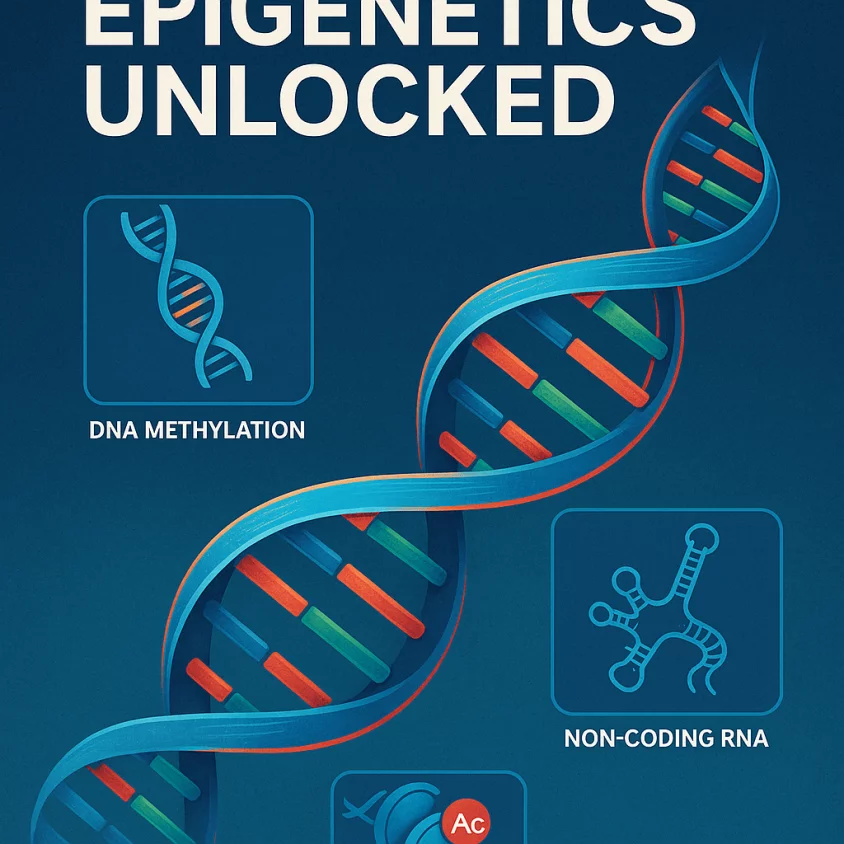Epigenetics Unlocked: Mastering the Language Beyond DNA

🔬 Introduction
While our genes provide the blueprint for life, it is epigenetics that determines how, when, and where those genes are expressed. Epigenetics is the study of heritable changes in gene function that do not involve changes to the DNA sequence itself. It explains why identical twins, with the same genetic code, can develop different diseases or why certain genes are active in one cell type but silent in another.
Epigenetic mechanisms control everything from development and aging to cancer and neurological disorders. Recent breakthroughs have also made epigenetics a target for new therapies, offering hope for conditions previously deemed untreatable.
This course provides a comprehensive and independent learning experience that covers everything you need to know about epigenetics. By the end, you will have a deep and thorough understanding of how epigenetics works and why it’s a game changer in modern biology and medicine.
📚 Course Outline
1. Understanding Epigenetics: The Science Beyond DNA
1.1 What is Epigenetics?
Definition: Changes in gene expression without altering the DNA sequence
Key players: DNA methylation, histone modification, non-coding RNAs
Epigenome vs. Genome: The epigenome regulates the way genes are turned on or off
1.2 The Importance of Epigenetics
Explains cell differentiation (e.g., liver cells vs. brain cells)
Central to understanding development, disease, and inheritance
Critical in fields like oncology, neurology, and regenerative medicine
2. The Molecular Mechanisms of Epigenetic Regulation
2.1 DNA Methylation
The addition of a methyl group (CH3) to cytosine bases in DNA
Usually leads to gene silencing
Key enzymes: DNA methyltransferases (DNMTs)
Role in X-chromosome inactivation and imprinting
2.2 Histone Modification
Histones are proteins around which DNA winds, forming chromatin
Modifications include:
Acetylation (activates gene expression)
Methylation (can activate or repress depending on location)
Phosphorylation and ubiquitination
The “Histone Code” hypothesis: Combinations of modifications dictate gene expression states
2.3 Non-Coding RNAs (ncRNAs)
Small RNA molecules that do not code for proteins but regulate gene expression
Types: microRNAs (miRNAs), small interfering RNAs (siRNAs), long non-coding RNAs (lncRNAs)
Role in post-transcriptional gene silencing
3. Epigenetics in Health and Disease
3.1 Development and Differentiation
Epigenetics is essential for turning pluripotent stem cells into specialized cells
Controls timing and pattern of gene expression during development
3.2 Epigenetics in Cancer
Tumor suppressor genes are often silenced by abnormal DNA methylation
Histone modifications contribute to uncontrolled cell growth
Epigenetic changes are reversible, making them attractive drug targets
3.3 Neurological Disorders
Epigenetic dysregulation is linked to autism, Alzheimer’s, schizophrenia
Studies show epigenetic therapies can restore normal brain function in animal models
3.4 Aging and Longevity
Epigenetic marks accumulate with age
Epigenetic “clocks” can predict biological age more accurately than chronological age
4. Cutting-Edge Applications of Epigenetics
4.1 Epigenetic Therapies
DNMT inhibitors (e.g., Azacitidine) used to treat certain leukemias
HDAC inhibitors for cancers and neurological disorders
Future therapies aim to reprogram epigenetic marks for disease reversal
4.2 Epigenetics in Personalized Medicine
Epigenetic profiles can help tailor treatments to individual patients
Used in cancer diagnostics and prognostic tests
4.3 Epigenetics in Agriculture
Modifying epigenetic marks in plants to improve yield and stress resistance
Epigenetic editing tools (e.g., dCas9 fused with epigenetic enzymes) are under development
5. Technologies and Tools in Epigenetics
5.1 Epigenome Mapping Techniques
Bisulfite sequencing for DNA methylation analysis
ChIP-Seq (Chromatin Immunoprecipitation Sequencing) for studying histone modifications
RNA-Seq for profiling non-coding RNAs
5.2 Emerging Tools
CRISPR-based epigenetic editing
ATAC-Seq for assessing chromatin accessibility
Single-cell epigenomics for studying individual cells' epigenetic states
6. Ethical and Societal Implications of Epigenetics
6.1 Epigenetic Inheritance
Can life experiences (e.g., diet, stress) affect the epigenome and be passed to offspring?
Growing evidence suggests transgenerational epigenetic inheritance is possible in mammals
6.2 Social and Legal Concerns
Will epigenetic information be used in insurance and employment discrimination?
Balancing scientific progress with ethical considerations
🚀 Conclusion
Epigenetics is rewriting the rules of genetics. It explains how cells with the same DNA can behave so differently and provides new avenues to treat, prevent, and even reverse disease. Mastering epigenetics is key to understanding the future of biology, medicine, and biotechnology.